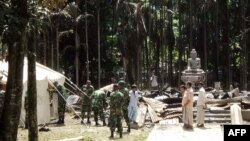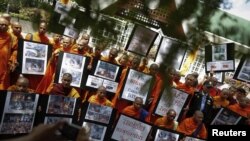NEW DELHI —
Bangladesh has increased security in the south east after Muslim protesters set fire to Buddhist temples and homes, attacks that were triggered by a Facebook photo of a burnt Quran, the Muslim holy book.
Soldiers and border guards Monday patrolled Buddhist-majority villages in Cox’s Bazar district. Authorities also banned gatherings as people fled after angry Muslims went on a rampage Saturday and Sunday, torching Buddhist shrines, smashing statues and attacking homes.
The wave of violence was triggered by a Facebook photo of a partially burned Quran. Muslims blamed the burning of the book on a Buddhist boy tagged in the photo.
Home Minister Mohiuddin Khan Alamgir has called the attacks a “deliberate” attempt to disrupt harmony. Authorities also promised to rebuild the temples. Sectarian clashes involving Buddhists and Muslims have been rare in Bangladesh -- a Muslim majority nation.
But political analysts say tensions between the two communities have been building in recent months after deadly clashes erupted between Buddhists and Muslims in neighboring Burma.
Bangladesh’s Buddhists are less than one percent of the population, and most live close to the border with Buddhist-majority Burma, also known as Myanmar.
“There was a simmering discontent among a section of the Muslims here in the bordering areas, who thought that the Muslims on the other side, in Myanmar, were treated wrongly, or badly in the hands of the regime as well as Buddhist religious people," said Ataur Rahman, a professor of political science at Dhaka University. "People travel across, they exchange news and views across the area. Of course you cannot rule out people trying to take political dividend out of it.”
Authorities in Cox’s Bazar district say they are doing everything possible to quell tension and restore peace between the two communities.
Rahman of Dhaka University says authorities in Bangladesh are on guard against the possibility of social media being used to incite trouble.
“People in that part of the country, sentiment is very important, so you can hoot up the sentiment of people along religious lines," siad Rahman. "You can always incite, and if you can visually show that Muslims are tortured, and you can show it in Facebook, and you can share, then automatically people become angry.”
Last month the government banned the popular search engine, YouTube, to prevent people seeing the anti-Islam video that has sparked huge protests in many Muslim countries.
Soldiers and border guards Monday patrolled Buddhist-majority villages in Cox’s Bazar district. Authorities also banned gatherings as people fled after angry Muslims went on a rampage Saturday and Sunday, torching Buddhist shrines, smashing statues and attacking homes.
The wave of violence was triggered by a Facebook photo of a partially burned Quran. Muslims blamed the burning of the book on a Buddhist boy tagged in the photo.
Home Minister Mohiuddin Khan Alamgir has called the attacks a “deliberate” attempt to disrupt harmony. Authorities also promised to rebuild the temples. Sectarian clashes involving Buddhists and Muslims have been rare in Bangladesh -- a Muslim majority nation.
But political analysts say tensions between the two communities have been building in recent months after deadly clashes erupted between Buddhists and Muslims in neighboring Burma.
Bangladesh’s Buddhists are less than one percent of the population, and most live close to the border with Buddhist-majority Burma, also known as Myanmar.
“There was a simmering discontent among a section of the Muslims here in the bordering areas, who thought that the Muslims on the other side, in Myanmar, were treated wrongly, or badly in the hands of the regime as well as Buddhist religious people," said Ataur Rahman, a professor of political science at Dhaka University. "People travel across, they exchange news and views across the area. Of course you cannot rule out people trying to take political dividend out of it.”
Authorities in Cox’s Bazar district say they are doing everything possible to quell tension and restore peace between the two communities.
Rahman of Dhaka University says authorities in Bangladesh are on guard against the possibility of social media being used to incite trouble.
“People in that part of the country, sentiment is very important, so you can hoot up the sentiment of people along religious lines," siad Rahman. "You can always incite, and if you can visually show that Muslims are tortured, and you can show it in Facebook, and you can share, then automatically people become angry.”
Last month the government banned the popular search engine, YouTube, to prevent people seeing the anti-Islam video that has sparked huge protests in many Muslim countries.





